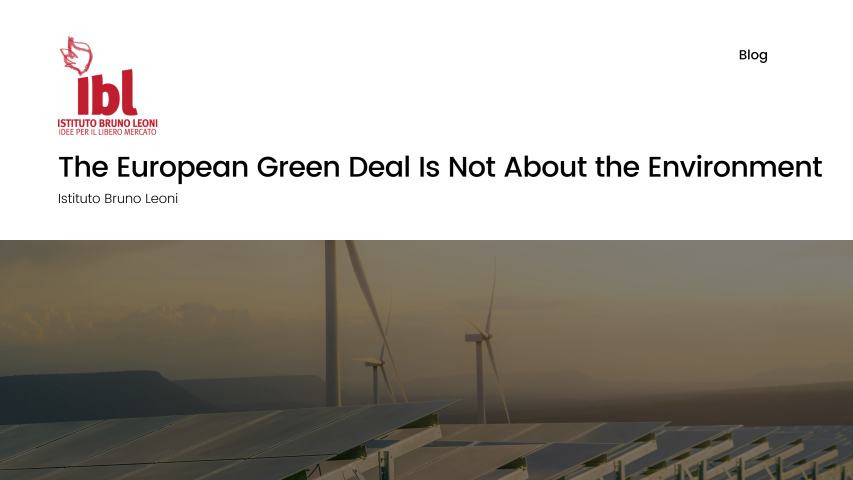The European Green Deal is Not About the Environment

The European Green Deal is Not About the Environment
IBL // 4 August 2023
The Italian minister of economic affairs, Giancarlo Giorgetti, has warned that radicalisation of environmental policies could result in a political “crisis of rejection” of their goals. These concerns are all but misguided.
Reducing emissions and improving environmental quality are goals worth pursuing. Europe itself has come a long way, if we hold true that we have achieved all the targets that we have set for ourselves so far and that our environmental performance is measured to be among the best in the world. Sustainability certainly qualifies as one of the most politically desirable aims – and perhaps the most important among many – but it would be a mistake to consider it as the only one.
Europe is already the cleanest economy in the world as a matter of fact, but if we want to rationally approach our ambition and keep it as such, we must take into account two principles that Brussels seems to have forgotten, especially after the COVID crisis.
On the one hand, goals can only be reached if they are reasonable. It is unthinkable to keep revising and raising targets when significant investments are required to meet them; and yet, the target for cutting emissions by 2030 has been raised from 40% to 55% within just a couple years. As a result, the timeline for drafting the guidelines on how to attain these goals has been stretched, and companies won’t receive the information they need before mid-2024. This leaves them with the impossible task of making massive investments in only five years, and they will have less time to implement those plans than what was spent on amending them since their first launch in 2018.
On the other hand, and in spite of the rhetoric surrounding them, European environmental policies are in fact turning away from environmental issues to engage in deliberate industrial planning. Any time a certain technology is promoted (e.g., electric cars) while another one is hindered (e.g., nuclear energy), we are giving up potential tools in the fight against climate change. It does not matter how fated the path may seem: technological innovation is not a straightforward process, and what seemed useless in the past may suddenly become necessary in light of new conditions and needs.
This shift in perspective also begs a shift in focus from those objectives that are strictly environmental (cutting emissions) and directing human, financial, and political resources to other ends (e.g., promoting specific technologies). This does not only impact environmental issues by forsaking potentially useful technologies, it also impacts economic and social ones, as it inevitably implies choosing winners and losers among industries on a mere political criterion.
To question this approach does not mean to be “against the environment”, as stated by EU Commission Vice-president Frans Timmermans in an interview on la Repubblica, but rather being against turning the environment into an excuse for pursuing one’s desired vision on industrial policy.
This article appeared first in Italian on IBL’s blog.
Download or share this blog post
EPICENTER publications and contributions from our member think tanks are designed to promote the discussion of economic issues and the role of markets in solving economic and social problems. As with all EPICENTER publications, the views expressed here are those of the author and not EPICENTER or its member think tanks (which have no corporate view).



